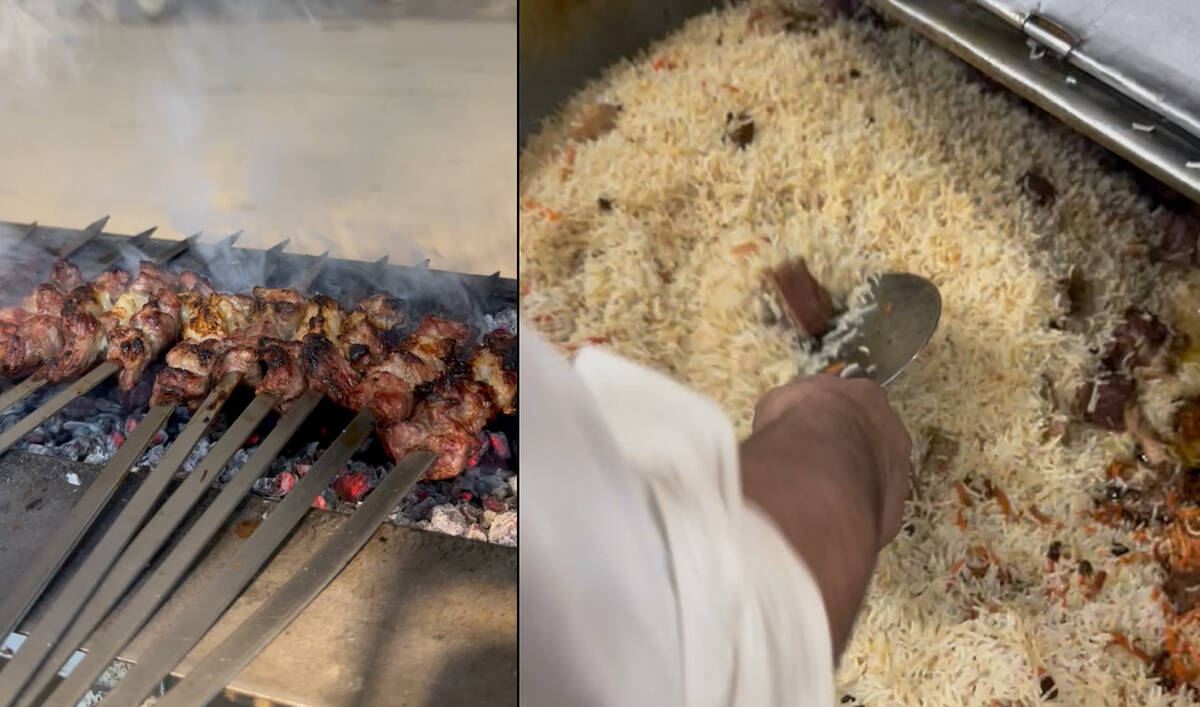DUBAI: In the Bawwaba section of the most recent edition of Art Dubai, Saudi artist Abdullah Al-Othman’s installation “Manifesto: Language & the City II” presented photographs and numerous illuminated signs and symbols in Arabic against two black walls, reflecting the urban signage one may find in Riyadh.
The installation was an evolution of a series that includes 2021’s “Manifesto: the Language and the City,” a multimedia installation exploring the linguistic and architectural landscape of Riyadh for the inaugural Diriyah Contemporary Art Biennale, which went on to be included in the Lyon Biennale in 2022, and “Fantasy Land,” which Al-Othman created for the Sharjah Islamic Arts Festival in 2021 — a neon wall installation exploring themes of human experience and the shifts between reality and illusion.

Abdullah Al-Othman’s installation “Manifesto: Language & the City II” presented photographs and numerous illuminated signs and symbols in Arabic. (Supplied)
“Language & the City II” pulsed with light and color and the expressive characters of the Arabic language made the viewer feel as if they were indeed on a bustling street in the Saudi capital. “Language is akin to history — it’s very deep,” Al-Othman tells Arab News. “Through my research I realized how language is like a brand for a culture — it references history and people. I study the language that we find in cities. The documentation of language affects the architectural style in an urban environment and the relationship between people and their environment.”
“Language & the City II” was made from a variety of materials, predominantly neon signage, lightboxes and wooden advertising signs that were once hung in the streets of Riyadh. Al-Othman’s installation brought them together to create a portrait of the city through its typographic, visual and architectural styles.
Riyadh’s identity, explains Al-Othman, is revealed through the language, style and vibrant colors of these lit symbols, offering a collective memory of a city in the throes of change.

Abdullah Al Othman at Art Dubai Manifesto Language and the City II for Bawwaba. (Courtesy Artist and Iris Projects. Credit Ismail Noor for Seeing Things)
As an artist and a poet, language has always played an important role in Al-Othman’s life. While he began as a writer, he arrived at a point where he could no longer fully express himself with words and turned to art, creating works that incorporate sound, found objects, sculpture, film and performance.
In 2017’s “Suspended Al-Balad,” for the 21,39, contemporary art festival, Al-Othman wrapped an entire building in Jeddah’s historic Al-Balad district, originally used as a shelter for widows and divorced women, with tin foil.
Al Othman’s intuitive approach to art creation leads him to organically move between and incorporate different mediums. Light is a significant element in his work, whether bouncing off tin foil or shining in neon to reflect the everyday urban environment of Riyadh.

Pieces from Al-Othman's latest project, 'Engineering the Unknown.' (Supplied)
“I want to create journeys for people to discover the importance of language,” says Al-Othman. “Language is a deeply important part of being human.”
Today Al-Othman continues to expand his research and art creation. He has recently published a book on his research supported by The King Abdulaziz Center for World Culture (Ithra) and the Saudi Cultural Development Fund.
Presently he is creating sculptures out of various Arabic words from made from different materials for his latest project, “Engineering the Incomplete.”
“In my artistic practice, I engage with language as an open field for analysis and reconstruction,” he writes in his statement for the new project. “I begin from moments of absence — from missing letters and fractured words — treating them as signals of the fragility inherent in the symbolic systems we rely on to make sense of the world.

Al-Othman's 'Manifesto - The Language & The City' at the 2022 Lyon Biennale. (Supplied)
“Failure to achieve perfection becomes an essential part of creation, not a flaw to be corrected,” he continues. “Incompleteness is not simply a void, but an active component that generates new, open-ended meanings. Each missing letter, each visual gap, forms an alternative path of reading and invites the viewer to reshape their relationship with language and the urban environment.”
“Engineering the Incomplete” uses the structure of the letter as an entity capable of both disintegration and destruction and therefore the resulting text as something that is unstable and constantly changing.
“My practice transforms language from a tool of communication into a material and temporal organism caught in the tension between structure and collapse,” Al-Othman adds. “Through material techniques that draw from urban elements and the reconfiguration of textual spaces, my work seeks to highlight the continuous tension between the desire for expression and the inherent limits of linguistic possibilities.”
Al-Othman says that “Engineering the Incomplete” is not an attempt to restore what is lost, but an invitation to read absence, or lacking, as another form of presence and a new beginning.
Incompleteness, he emphasizes, offers “a way to produce new meaning and vision.”




















